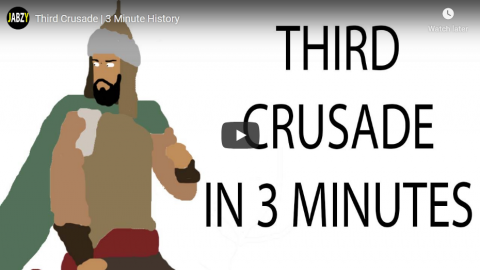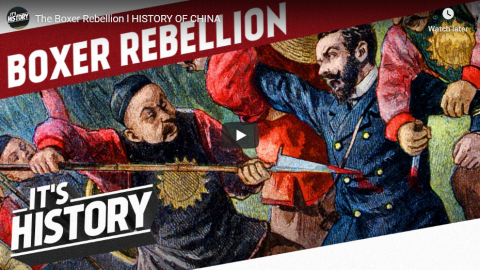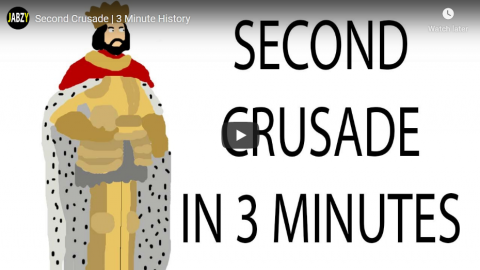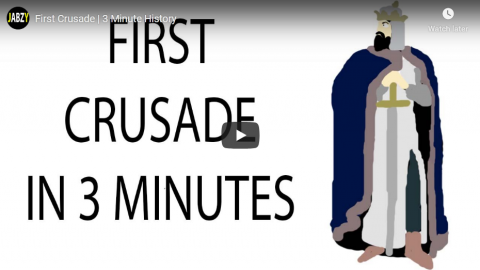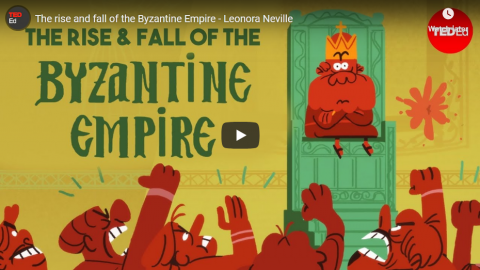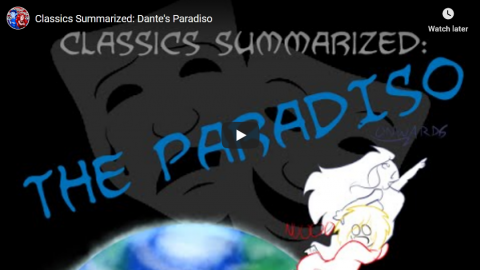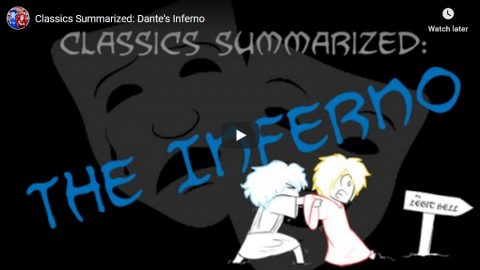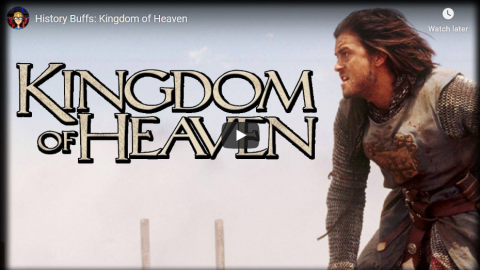Jabzy
Published 25 Jul 2015Thanks to Xios, Alan Haskayne, Lachlan Lindenmayer, William Crabb, Derpvic, Seth Reeves and all my other Patrons. If you want to help out – https://www.patreon.com/Jabzy?ty=h
March 31, 2020
Third Crusade | 3 Minute History
March 27, 2020
March 26, 2020
The Boxer Rebellion l HISTORY OF CHINA
IT’S HISTORY
Published 26 Aug 2015The Boxer Rebellion was one of China’s biggest uprisings against the unwanted European, US-American and Japanese imperialism. Distrust and tensions marked all contacts with foreigners. Secret societies were formed to propagate against the enemy. The Yihequan, also known as Boxers, quickly rose to one of the biggest organisations in Northern China. Masters of close combat, they mainly targeted converted Chinese Christians and attacks increased wildly in the 1880s. From 1900 Empress Dowager Cixi was less and less opposed to the Rebellion, as she hoped to fight back foreign influence. Shortly after, even the Chinese Army started helping the rebels and foreigners were fought, killed or driven out. Consequently, an alliance of the imperial powers sent in 50,000 soldiers to end the massacre. Tough reprisals and treaties followed. Learn all about the Boxer Rebellion on IT’S HISTORY.
» JOIN OUR COMMUNITY FOR MORE HISTORY KNOWLEDGE!
Follow us on Twitter: http://twitter.com/thehistoryshow
Your photos on Instagram: https://instagram.com/itshistorychannel» SOURCES
Videos: British Pathé (https://www.youtube.com/user/britishp…)
Pictures: mainly Picture Alliance
Content:
Harrington, Peter: Peking 1900: The Boxer Rebellion, Osprey Campaign
Bodin, Lynn: The Boxer Rebellion, Men-at-Arms
http://www.historyofwar.org/articles/…
http://www.chinafolio.com/chinas-last…» ABOUT US
IT’S HISTORY is a ride through history – Join us discovering the world’s most important eras in IN TIME, BIOGRAPHIES of the GREATEST MINDS and the most important INVENTIONS.» HOW CAN I SUPPORT YOUR CHANNEL?
You can support us by sharing our videos with your friends and spreading the word about our work.» CAN I EMBED YOUR VIDEOS ON MY WEBSITE?
Of course, you can embed our videos on your website. We are happy if you show our channel to your friends, fellow students, classmates, professors, teachers or neighbors. Or just share our videos on Facebook, Twitter, Reddit etc. Subscribe to our channel and like our videos with a thumbs up.» CAN I SHOW YOUR VIDEOS IN CLASS?
Of course! Tell your teachers or professors about our channel and our videos. We’re happy if we can contribute with our videos.» CREDITS
Presented by: Indy Neidell
Script by: Dan Hungerford
Directed by: Daniel Czepelczauer
Director of Photography: Markus Kretzschmar
Music: Markus Kretzschmar
Sound Design: Bojan Novic
Editing: Markus KretzschmarA Mediakraft Networks original channel
Based on a concept by Florian Wittig and Daniel Czepelczauer
Executive Producers: Astrid Deinhard-Olsson, Spartacus Olsson
Head of Production: Michael Wendt
Producer: Daniel Czepelczauer
Social Media Manager: Laura PaganContains material licensed from British Pathé
All rights reserved – © Mediakraft Networks GmbH, 2015
March 22, 2020
QotD: The notion of Hell
I know we all follow the theological debates within Catholicism about which saint got in touch with which angel to channel which biblical dead person — don’t they have a show on CNN that goes over each week’s highlights? — but one thing you never do, in Catholicism, Protestantism, or Pentecostal Snake-Handlingism, for that matter, is say there’s no hell.
Because that would be Jewish. The Jews have never cared that much about hell. They grudgingly admit that it’s probably there, but it’s just this place that, after you die, you feel intense shame before God for all the times you yelled at your wife or failed to stuff two dollars into the self-parking kiosk. The Hebrew word for hell is “Gehenna,” which is the name of the garbage dump outside Jerusalem that (a) smelled bad, and (b) was always on fire. I can imagine generations of parents using it as a threat to their unruly children: “If you don’t straighten up right this minute, I’m gonna throw you into the smelly garbage dump with the smoke cloud over it!”
So when the Christians come along, they take Gehenna and run with it. They use the name Gehenna to mean hell, and that’s not just trash burning out there, it’s demons and human souls, and it burns forever because it’s mixed with brimstone, which does indeed smell bad when you burn it. Actually brimstone turns red and burns blue, so if you’ve got brimstone out there, you’ve got a blood red gelatinous mass with a blue flame, or what the great preachers call …
The Lake of Fire.
[…]
At any rate, the reason the Catholic press got their cassocks in a bunch is that, over the past half century or so, a lot of theologians have been saying, “Maybe we got the whole hell thing wrong.” They’ve looked back over the appropriate scriptures and decided that, after you die, you don’t get thrown into the flaming garbage dump, you just vanish from all human history, as though you never existed. There’s no memory or trace of you, you’re erased from the universe.
And this might be what the Pope said he believes. After Eugenio reported their conversation, the Vatican scrambled around and issued statements saying that, no, the Pope didn’t go outside the catechism and they were just chewing the fat and please everybody let’s not get carried away. Yes, Gehenna is real. Yes, the Pope believes in hell. Yes, the Pope is Catholic.
Joe Bob Briggs, “Pope Forgets the Lake of Fire”, Taki’s Magazine, 2018-06-21.
March 19, 2020
Second Crusade | 3 Minute History
March 18, 2020
A classic “dirty book” of the late Middle Ages
I’m not well read in the classics, being much more of a history reader myself, so I didn’t know anything about The Decameron. Arthur Chrenkoff provides a helpful thumbnail of the book:
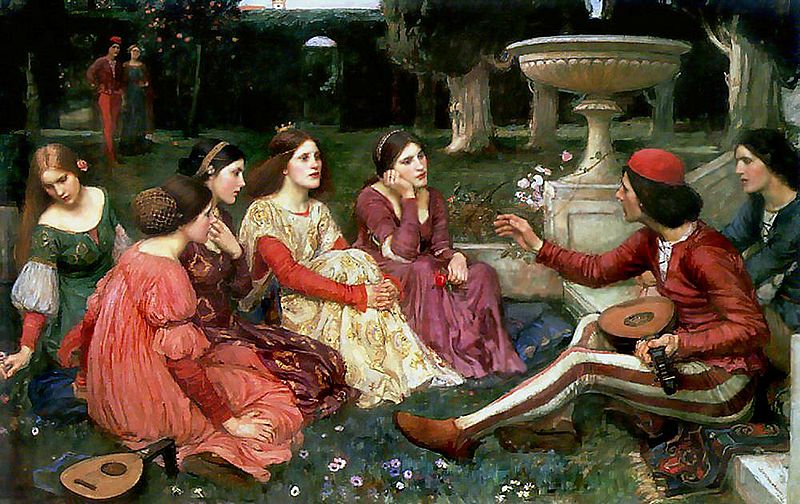
“A Tale from the Decameron” by John William Waterhouse (1916).
Image from the Lady Lever Art Gallery via Wikimedia Commons.
Giovanni Boccaccio had written The Decameron in the aftermath of the Black Death pandemic of 1348, which carried away somewhere around one third of the European population. The book is set in a monastery, where seven young women and three young men, the Millennials of the day, self-quarantine themselves for ten days to avoid the plague and while away their days (there was no internet in those days, you see) telling each other stories, ten each day, all based around a chosen theme, such as love that ends happily or the tricks that women play on men. Many of the stories are a bit dirty, which is why The Decameron was put on the Catholic Church’s index of prohibited books; more interestingly, it was also banned in Australia until 1973, on pretty similar grounds.
March 17, 2020
QotD: The luck of the Irish
Making dark comments about the likelihood of an unhappy outcome is the way we Irish Catholics deal with anxiety, dread, and uncertainty. It’s our special pact with God: If we expect the worst, obsess about it, worry about it, drink about it, indulge in black humor, and honestly convince ourselves that something awful is going to happen, then God will step in and prevent said awful thing from happening just to mess with our heads. But you have to sincerely expect the worst, not just go through the motions. It’s when you expect good things to happen or keep happening — when you presume upon God — that bad things happen. Remember what happened when the Irish presumed upon all those potatoes?
Dan Savage, “Welcome Black”, AndrewSullivan.com, 2005-08-08.
March 14, 2020
History Summarized: Ethiopia
Overly Sarcastic Productions
Published 13 Mar 2020Ethiopian History gets started early and just keeps on going. From the dawn of humanity itself through the medieval period and into the modern day, the history of the kingdom at the end of the Blue Nile is full of surprises.
SOURCES & Further Reading: Harold Marcus A History of Ethiopia and John Jackson’s Ethiopia and the Origins of Civilization, see also Kenneth Vickery’s lecture “Ethiopia: Outpost of Christianity” and William Cook’s lecture “The Rock-Hewn Churches of Ethiopia” via The Great Courses.
This video was edited by Sophia Ricciardi AKA “Indigo”. https://www.sophiakricci.com/
Our content is intended for teenage audiences and up.
PATREON: https://www.Patreon.com/OSP
DISCORD: https://discord.gg/h3AqJPe
MERCH LINKS: https://www.redbubble.com/people/OSPY…
OUR WEBSITE: https://www.OverlySarcasticProductions.com
Find us on Twitter https://www.Twitter.com/OSPYouTube
Find us on Reddit https://www.Reddit.com/r/OSP/
March 5, 2020
First Crusade | 3 Minute History
March 1, 2020
The rise and fall of the Byzantine Empire – Leonora Neville
TED-Ed
Published 9 Apr 2018Check out our Patreon page: https://www.patreon.com/teded
View full lesson: https://ed.ted.com/lessons/the-rise-a…
Most history books will tell you that the Roman Empire fell in the fifth century CE, but this would’ve come as a surprise to the millions who lived in the Roman Empire through the Middle Ages. This Medieval Roman Empire, today called the Byzantine Empire, began when Constantine, the first Christian emperor, moved Rome’s capital. Leonora Neville details the rise and fall of the Byzantine Empire.
Lesson by Leonora Neville, animation by Remus & Kiki.
Thank you so much to our patrons for your support! Without you this video would not be possible! Abhijit Kiran Valluri, Mandeep Singh, Sama aafghani, Vinicius Lhullier, Connor Wytko, Marylise CHAUFFETON, Marvin Vizuett, Jayant Sahewal, Quinn Shen, Caleb ross, Elnathan Joshua Bangayan, Gaurav Rana, Mullaiarasu Sundaramurthy, Jose Henrique Leopoldo e Silva, Dan Paterniti, Jose Schroeder, Jerome Froelich, Tyler Yoshizumi, Martin Stephen, Justin Carpani, Faiza Imtiaz, Khalifa Alhulail, Tejas Dc, Govind Shukla, Srikote Naewchampa, Ex Foedus, Sage Curie, Exal Enrique Cisneros Tuch, Vignan Velivela, Ahmad Hyari, A Hundred Years, eden sher, Travis Wehrman, Minh Tran, Louisa Lee, Kiara Taylor, Hoang Viet, Nathan A. Wright, Jast3 , Аркадий Скайуокер, Milad Mostafavi, Singh Devesh Sourabh, Ashley Maldonado, Clarence E. Harper Jr., Bojana Golubovic, Mihail Radu Pantilimon, Sarah Yaghi, Benedict Chuah, Karthik Cherala, haventfiguredout, Violeta Cervantes, Elaine Fitzpatrick, Lyn-z Schulte, cnorahs, Henrique ‘Sorín’ Cassús, Tim Robinson, Jun Cai, Paul Schneider, Amber Wood, Ophelia Gibson Best, and Cas Jamieson.
February 22, 2020
Classics Summarized: Dante’s Paradiso
Overly Sarcastic Productions
Published 28 Jun 2015At last! The thrilling conclusion!
Oh god this took so long D:
February 19, 2020
Classics Summarized: Dante’s Inferno
Overly Sarcastic Productions
Published 21 Mar 2015I’m back, baby!
For this week’s venture into literature, we take a broad look at The Inferno. Hold onto your butts.
PATREON: https://www.patreon.com/user?u=4664797
MERCH LINKS:
Shirts – https://overlysarcasticproducts.threa…
All the other stuff – http://www.cafepress.com/OverlySarcas…Find us on Twitter @OSPYouTube!
February 17, 2020
QotD: Hitchens’ rule of morality
Whenever I heard some bigmouth in Washington or the Christian heartland banging on about the evils of sodomy or whatever, I mentally enter his name in my notebook and contentedly set my watch. Sooner rather than later, he will be discovered down on his weary and well-worn old knees in some dreary motel or latrine, with an expired Visa card, having tried to pay well over the odds to be peed upon by some Apache transvestite.
Christopher Hitchens, quoted by Douglas Murray in “Beware the creepy male feminist: ‘White knights’ like Robert De Niro often turn out to be less than chivalrous”, Unherd, 2019-11-15.
February 10, 2020
History Buffs: Kingdom of Heaven
History Buffs
Published 15 Aug 2015Apparently, Orlando Bloom was suffering from a nasty cold when shooting a big chunk of this movie. I think it shows … Anyway, it’s time for a brand new episode of History Buffs! Enjoy guys and thank you so much for all your support!
February 6, 2020
QotD: Saint Paul
The anti-booze activists of the church tend to waffle a bit when you bring up the wedding at Cana. It’s a metaphor for something else, they might say, or they come up with biblical quotes to justify their stance, most of which come from that Saint Paul chap, as far as I can figure out. Look, I’m sure Saint Paul was a decent fellow and good to his mother, but he was not a barrel of fun. Old Miseryguts — as I’m sure his former friends called him after his conversion — was against practically everything that makes this vale of tears at all palatable. You will look in vain for a joke of any sort in either of the Epistles to the Corinthians, and the Thessalonians don’t get off much lighter.
Nicholas Pashley, Notes on a Beermat: Drinking and Why It’s Necessary, 2001.

